Mexico’s Intensified Border Enforcement Amid U.S. Election Pressure
As the U.S. election approaches, Mexico has intensified its border enforcement, leading to a significant decline in migrant crossings to the U.S. This action stems from an unrecorded agreement with the Biden administration, driven by economic interests and political considerations amid the electoral landscape. Many migrants, however, face increasing hardships as Mexico implements strict immigration policies, raising questions about the future of Mexico’s role in U.S. immigration management.
As the United States approaches its upcoming presidential election, Mexico has ramped up its border enforcement aimed at curbing the flow of migrants attempting to reach the U.S. border. Recent analyses suggest that Mexico’s compliance is influenced by an implicit agreement with the Biden administration, established last year, which aligns with Mexico’s economic interests in maintaining a stable border and ensuring the continued flow of exports to the U.S. The political stakes are significant for Mexico, where the current administration is keenly aware that any perceived lapse in border control could lead to disadvantages for the Democratic party, particularly for Vice President Kamala Harris, whose stance on immigration issues is considered a vulnerable point in her political position. Data indicate a substantial decrease in illegal border crossings, with encounters plummeting from nearly 250,000 in December to under 60,000 by the previous month, marking the lowest levels since the Trump administration. However, this has been accompanied by a stark increase in migrant encounters reported by Mexico’s immigration agency, indicating a complex scenario where enforcement within Mexico has intensified. Numerous migrants, such as a Venezuelan family, have faced heightened challenges as they navigate Mexico’s changing immigration landscape. Stricter controls have led many to become stranded in urban centers, living in precarious conditions while awaiting opportunities to move north. Efforts to control migration by Mexico are evidenced by stringent immigration policies like increased visa requirements and asylum restrictions, as well as enhanced deportation proceedings. The Biden administration’s strategy to manage this crisis involved high-level discussions with Mexico’s officials, where a mix of incentives and deterrents were applied. With a sizeable reliance on trade with the U.S., Mexico’s economy is heavily affected by border dynamics, prompting its government to maintain a vigilant stance on migration through newly instituted policies aimed at mitigating the surge. While the United States has not formally endorsed these tactics, the implications of migrant management have become a critical topic influencing the bilateral relationship and the political landscape in both countries.
The interplay between U.S. and Mexican immigration policy has significant ramifications, particularly as the U.S. prepares for its presidential election. The Biden administration’s approach to immigration has necessitated a partnership with Mexico, which has resulted in both countries developing a tacit agreement to manage migration flows. Given the implications of immigration on electoral politics in the U.S., Mexico’s role has become pivotal, prompting its government to enforce stronger border protocols to control migrant movements. Historical data illustrates a concerning increase in the number of migrants attempting to cross into the United States, leading to humanitarian crises in various cities across America. Mexico, traditionally a transit country for migrants from Central America and beyond, now finds itself in a position where its policies can significantly sway U.S. electoral outcomes, both politically and economically. This creates a dynamic relationship heavily reliant on the prevailing immigration patterns and enforcement measures implemented on both sides of the border.
In summary, Mexico’s evolving immigration enforcement measures, influenced by a complex U.S.-Mexico agreement and the impending U.S. presidential election, reflect the high stakes involved in migration issues. With illegal border crossings notably reduced, the ongoing challenges faced by migrants stranded in Mexico shed light on the difficult balance between humanitarian needs and political maneuvering. As both countries navigate these turbulent waters, it remains to be seen how sustained these enforcement practices will be under Mexico’s new leadership, and what impact they will have on politics in both nations moving forward.
Original Source: www.usatoday.com




Post Comment